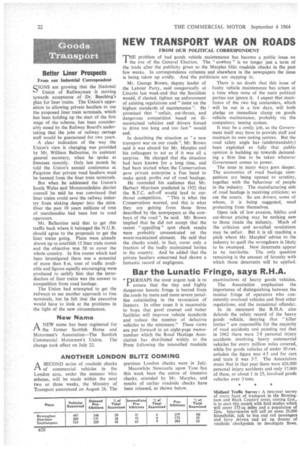NEW TRANSPORT WAR ON ROADS
Page 24

If you've noticed an error in this article please click here to report it so we can fix it.
FROM OUR POLITICAL CORRESPONDENT
T"problem of bad goods vehicle maintenance has become a public issue on the eve of the General Election. The " cowboy " is no longer just a term of the trade after the publicity given to the Marples blitz roadside checks in the past few weeks. In correspondence columns and elsewhere in the newspapers the issue is being taken up avidly. And the politicians are stepping in.
Mr. George Brown, deputy leader of the Labour Party, said categorically at . Lincoln last week-end that the Socialists would, if elected, tighten up enforcement of existing regulations and "insist on the highest standards of maintenance". He / promised that "unfair, cut-throat, and dangerous competition based on illmaintained vehicles and drivers forced to drive too long and too fast" would end, In describing the situation as "a new transport war on our roads ", Mr. Brown said it was absurd for Mr. Marples and his colleagues to act as if it was all a surprise. He charged that the situation had been known for a long time, and had been started when the Conservatives gave private enterprise a free hand to make quick profits out of road haulage.
He reminded his audience that Mr. Herbert Morrison predicted in 1952 that the B.T.C. sell-off would lead to cutthroat competition. "This is what the Conservatives wanted, and this is what they are getting from those firms described by the newspapers as the cowboys of the road ", he said. Mr. Brown implied that he did not accept that the recent " appalling " spot check results were probably concentrated on the worst-maintained element. He said that the checks could, in fact, cover only a fraction of the badly maintained lorries in the country. And he added that the private hauliers concerned had shown a fantastic record of negligence.
There is no doubt that this issue of faulty vehicle maintenance has arisen at a time when none of the main political parties can ignore it. I expect that manifestos of the two big contenders, which will be out in a few days, will both pledge an immediate clamp on goods vehicle maintenance, probably via the compulsory testing system.
It may be a costly job, as the Government itself may have to provide staff and maintain its own testing centres. But the road safety angle has (understandably) been exploited so fully that public opinion is building up towards demanding a firm line to be taken whatever Government comes to power.
The issue in many ways goes deeper. The economics of road haulage competition are being opened to scrutiny, together with the behaviour of people in the industry. The manufacturing side of road haulage is receiving criticism; so are the courts. So are drivers, some of whom, it is being suggested, need protecting from themselves.
Open talk of law evasion, fiddles and cut-throat pricing may be nothing new to those inside the industry. Much of the criticism and so-called revelations may be unfair. But it is all reaching a pitch where Mr. Marples' advice to the industry to quell the wrongdoers is likely to be swamped. New deterrents appear to be inevitable. The only question remaining is the amount of ferocity with which those deterrents will be applied.
































































































































